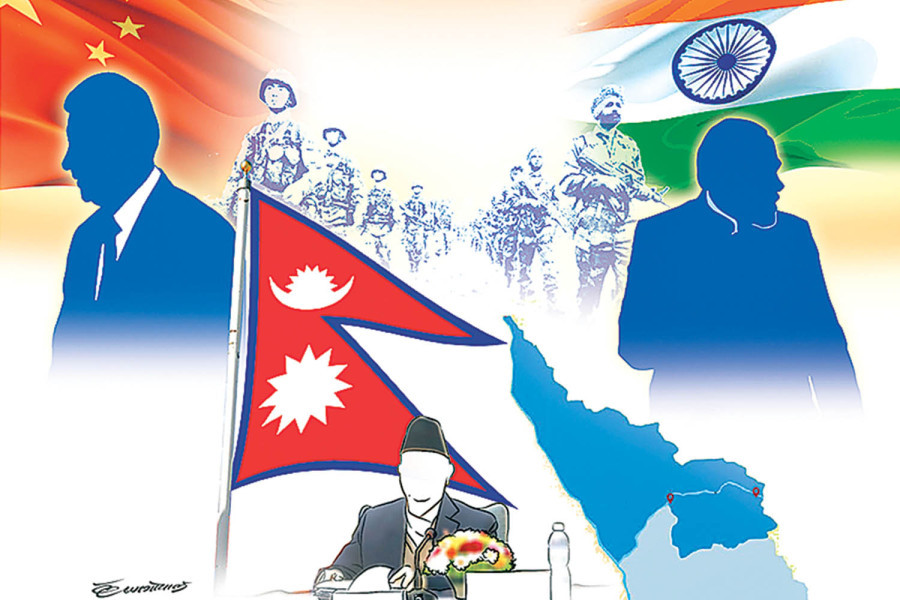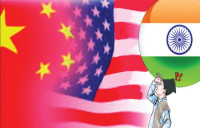Columns
Oli’s diplomatic snubs
Prime Minister Oli’s anti-India actions and pro-China alignment cause diplomatic uncertainty.
Ajaya Bhadra Khanal
On August 17, India’s Foreign Secretary extended a standing invitation to Nepal’s Prime Minister KP Sharma Oli, but the visit now appears uncertain, with the Indian media reporting that the visit, unofficially scheduled for September 16, has been postponed.
A series of events over the past few weeks indicates that India has once again snubbed Oli for his undiplomatic and jingoistic behaviour, including actively whipping up anti-India sentiments over the border issue and aligning with China even more closely.
Only a few weeks earlier, Oli was also planning to meet Indian Prime Minister Narendra Modi on the sidelines of the Shanghai Cooperation Organisation (SCO) summit in Tianjin. According to people with direct knowledge, the tone of that meeting was expected to decide whether Oli would visit India in September or not. That meeting in Tianjin was also scrapped, indicating that India is not happy with Oli at the moment.
This will further push Oli away from India and the West, even while putting pressure on the Nepali Congress to correct the course of Nepal’s foreign policy.
It is not too late for Oli to correct course and mend relations with our neighbours. Both national security and economic growth strategies require Nepal to build trusted relations with India, China and the West.
Nepal can practice strategic autonomy even while maintaining a trusted relationship with its neighbours and friends. However, for that to happen, Nepal must enhance its diplomatic capacity and balance its political relations.
Oli cannot help but display anti-Indian tendencies over sensitive diplomatic issues. Anti-Indian and anti-West sentiments appear to have become a core part of Oli and his party, CPN-UML’s political identity.
For instance, when India and China agreed to open up the Lipulekh pass for trading, Nepal could have opted to protest quietly by pursuing diplomatic channels. Instead, the issue was politicised publicly by Oli’s confidantes, which reflected the aggressive discourse Oli set five years ago.
Not satisfied, Oli also raised the issue with Chinese President Xi Jinping, who said the dispute was a “bilateral” issue between Nepal and India.
The Ministry of Foreign Affairs released a statement on August 20 claiming that “Nepal government is clear on the fact that Nepal’s official map has been included in the constitution of Nepal, and in that map Limpiyadhura, Lipulekh and Kalapani, lying east of the Mahakali river, are part of Nepal’s integrated territory.”
The government of Nepal’s statement also says Nepal would proceed on the matter “diplomatically” based on the “essence and spirit of the intimate and friendly relations” between the two countries and on the historical treaties, agreements, facts, maps and evidence.”
India, on the other hand, believes that Nepal’s claims over Limpiyadhura area “are neither justified nor based on historical facts and evidence.” It also claims that “border trade between India and China through Lipulekh pass had commenced in 1954 and has been going on for decades.”
India says it is ready to talk on resolving outstanding boundary issues, but with the caveat that it would entertain only those issues that are “agreed upon” by the two sides as “outstanding.”
However, Nepal’s approach to this matter has neither been diplomatic, nor has the statement made clear what historical facts and evidence Nepal has regarding its claims over the territory.
In the last two weeks, Oli has not only alienated India but also the West and Japan. Nepal has firmly shown itself to be a close ally of China and indifferent to the sensibilities of Western democracies and Japan. For example, Japan had requested countries not to take part in the parade as it had anti-Japanese undertones that continue to persist after 80 years.
Despite adopting a policy of non-alignment and strategic autonomy, Oli has pushed Nepal further into China’s lap. This will have long-lasting implications for Nepal’s foreign policy and Oli’s international relations.
During his visit to China, Oli attended the SCO summit, supported the Global Security Initiative of China, and attended the parade marking the “80th anniversary of the victory in the Chinese People's War of Resistance against Japanese Aggression and the World Anti-Fascist War.”
The New York Times described the parade as “a rare gathering of autocrats who have positioned themselves in opposition to the U.S.-led world order.” It was also a symbolic event to “stoke” Chinese nationalism and highlight the Communist Party of China as a “saviour” of the country.
Given the symbolism of the event, major Western democracies abstained from it. As a result, the event became a clear marker of the divide between the West and China, which is trying to forge a new world order.
Oli’s participation in the Chinese parade, among the 25 heads of state, has firmly established Nepal in the anti-West, anti-US and anti-Japan camp from which it will be difficult for Nepal to extract itself. On the other hand, China will view Nepal’s participation in the event as an expression of valuable support, which could have a long-term impact.
This means that if Nepal is to implement its policy of strategic autonomy, it will have to work harder to gain the confidence of the West. And if Nepal fails to extract developmental benefits from China, Nepal’s posture will be in vain.
The pro-Chinese forces in Nepal usually argue that India’s rivalry with China in Nepal will subside as the two countries grow together. The seeming rapprochement between India and China has given false justification to such forces in Nepal, including those in Oli’s camp.
The apparent thawing in relations between China and India will not affect their rivalry in Nepal, at least in the short term. India is adopting a policy of strategic autonomy, and it is using its relations with Russia and China to safeguard and promote its interests. However, for the longer term, India’s bilateral relations with China have structural tensions, which will continue to come to the fore.
Given the developing situation, Nepal’s foreign policy needs to consider at least three major factors: Nepal’s national security, economic growth and vision for a new global order that serves its interests. At present, Oli’s foreign policy is driven more by personal whims than national needs, and it is unfortunate that the Nepali Congress, for some reason, is aligned with Oli’s unhinged strategies.




 8.99°C Kathmandu
8.99°C Kathmandu.jpg)















